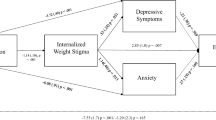Abstract
Body dissatisfaction is a major source of suffering among women of all ages. One potential factor that could mitigate body dissatisfaction is self-compassion, a construct that is garnering increasing research attention due to its strong association with psychological health. This study investigated whether a brief 3-week period of self-compassion meditation training would improve body satisfaction in a multigenerational group of women. Participants were randomized either to the meditation intervention group (N = 98; M age = 38.42) or to a waitlist control group (N = 130; M age = 36.42). Results suggested that compared to the control group, intervention participants experienced significantly greater reductions in body dissatisfaction, body shame, and contingent self-worth based on appearance, as well as greater gains in self-compassion and body appreciation. All improvements were maintained when assessed 3 months later. Self-compassion meditation may be a useful and cost-effective means of improving body image in adult women.
Similar content being viewed by others
References
Adams, C. E., & Leary, M. R. (2007). Promoting self-compassionate attitudes toward eating among restrictive and guilty eaters. Journal of Social and Clinical Psychology, 26, 1120–1144.
Adams, C. E., Benitez, L., Kinsaul, J., McVay, M. A., Barbry, A., Thibodeaux, A., & Copeland, A. L. (2013). Effects of brief mindfulness instructions on reactions to body image stimuli among female smokers: An experimental study. Nicotine & Tobacco Research, 15, 376–384.
American Psychiatric Association. (2000). Diagnostic and statistical manual of mental disorders, 4th edn, text revision. Washington: American Psychiatric Association.
Avalos, L., Tylka, T. L., & Wood-Barcalow, N. (2005). The Body Appreciation Scale: Development and psychometric evaluation. Body Image, 2, 285–297.
Barnard, L. K., & Curry, J. F. (2011). Self-compassion: Conceptualizations, correlates, & interventions. Review of general psychology, 15, 289.
Brach, T. (2003). Radical acceptance: Embracing your life with the heart of a Buddha. New York: Bantam.
Breen, W. E., Kashdan, T. B., Lenser, M. L., & Fincham, F. D. (2010). Gratitude and forgiveness: Convergence and divergence on self-report and informant ratings. Personality and Individual Differences, 49, 932–937.
Breines, J. G., Crocker, J., & Garcia, J. A. (2008). Self-objectification and well-being in women’s daily lives. Personality and Social Psychology Bulletin, 34, 583–597.
Britton, W. B., Bootzin, R. R., Cousins, J. C., Hasler, B. P., Peck, T., & Shapiro, S. L. (2010). The contribution of mindfulness practice to a multicomponent behavioral sleep intervention following substance abuse treatment in adolescents: a treatment-development study. Substance Abuse, 31, 86–97.
Cash, T. F., & Szymanski, M. L. (1995). The development and validation of the Body-Ideals Questionnaire. Journal of Personality Assessment, 64, 466–477.
Christensen, H., Griffiths, K. M., & Jorm, A. F. (2004). Delivering interventions for depression by using the internet: randomized controlled trial. BMJ, 328, 265. doi:10.1136/bmj.37945.566632.EE.
Cohen, J. (1988). Statistical power analysis for the behavioral sciences, 2nd edn. Hillsdale: Erlbaum.
Cooper, P. J., Taylor, M. J., Cooper, Z., & Fairbum, C. G. (1987). The development and validation of the Body Shape Questionnaire. International Journal of eating disorders, 6, 485–494.
Costa, J., & Pinto-Gouveia, J. (2011). Acceptance of pain, self-compassion and psychopathology: Using the chronic pain acceptance questionnaire to identify patients’ subgroups. Clinical Psychology and Psychotherapy, 18, 292–302.
Crocker, J., & Wolfe, C. T. (2001). Contingencies of self-worth. Psychological Review, 108, 593–623.
Crocker, J., Luhtanen, R. K., Cooper, M. L., & Bouvrette, A. (2003). Contingencies of self- worth in college students: Theory and measurement. Journal of Personality and Social Psychology, 85, 894.
Dekeyser, M., Raes, F., Leijssen, M., Leysen, S., & Dewulf, D. (2008). Mindfulness skills and interpersonal behaviour. Personality and Individual Differences, 44, 1235–1245.
Delinsky, S. S., & Wilson, G. T. (2006). Mirror exposure for the treatment of body image disturbance. International Journal of Eating Disorders, 39, 108–116.
Evans, C., & Dolan, B. (1993). Body Shape Questionnaire: derivation of shortened “alternate forms”. International Journal of Eating Disorders, 13, 315–321.
Eysenbach, G. (2005). The law of attrition. Journal of medical Internet Research, 7. doi:10.2196/jmir.7.1.e11.
Ferreira, C., Pinto-Gouveia, J., & Duarte, C. (2013). Self-compassion in the face of shame and body image dissatisfaction: Implications for eating disorders. Eating Behaviors, 114, 207–210.
Finely-Straus, A. D. (2011). The relationship between self-compassion and disordered eating behaviors: Body dissatisfaction, perfectionism, and contingent self worth as mediators. Unpublished doctoral dissertation. The University of Texas at Austin.
Fredrickson, B. L., & Roberts, T. (1997). Objectification theory: Toward understanding women’s lived experiences and mental health risks. Psychology of Women Quarterly, 21, 173–206.
Gale, C., Gilbert, P., Read, N., & Goss, K. (2012). An evaluation of the impact of introducing compassion focused therapy to a standard treatment programme for people with eating disorders. Clinical Psychology & Psychotherapy. doi:10.1002/cpp.1806.
Ganem, P. A., Heer, H. D., & Morera, O. F. (2009). Does body dissatisfaction predict mental health outcomes in a sample of predominantly Hispanic college students? Personality and Individual Differences, 46, 557–561.
Germer, C. K. (2009). The mindful path to self-compassion: Freeing yourself from destructive thoughts and emotions. New York: Guilford.
Gilbert, P. (2010). Compassion focused therapy: Distinctive features. London: Routledge.
Gilbert, P., & Miles, J. (2002). Body shame: Conceptualization, research, and treatment. New York: Routledge.
Gilbert, P., & Procter, S. (2006). Compassionate mind training for people with high shame and self-criticism: Overview and pilot study of a group therapy approach. Clinical Psychology & Psychotherapy, 13, 353–379.
Glück, T. M., & Maercker, A. (2011). A randomized controlled pilot study of a brief web-based mindfulness training. BMC psychiatry, 11, 175.
Grippo, K. P., & Hill, M. S. (2008). Self-objectification, habitual body monitoring, and body dissatisfaction in older European American women: Exploring age and feminism as moderators. Body Image, 5, 173–182.
Grogan, S. (2008). Body image: Understanding body dissatisfaction in men, women, and children (2nd ed.). New York: Rutledge.
Grossbard, J. R., Lee, C. M., Neighbors, C., & Larimer, M. E. (2009). Body image concerns and contingent self-esteem in male and female college students. Sex Roles, 60, 198–207.
Harter, S. (1999). The construction of the self: A developmental perspective. New York: Guilford.
Heffernan, M., Griffin, M., McNulty, S., & Fitzpatrick, J. J. (2010). Self-compassion and emotional intelligence in nurses. International Journal of Nursing Practice, 16, 366–373.
Hofmann, S. G., Grossman, P., & Hinton, D. E. (2011). Loving-kindness and compassion meditation: Potential for psychological interventions. Clinical Psychology Review, 31, 1126–1132.
Hollis-Walker, L., & Colosimo, K. (2011). Mindfulness, self-compassion, and happiness in non-meditators: A theoretical and empirical examination. Personality and Individual Differences, 50, 222–227.
Jarry, J. L., & Berardi, K. (2004). Characteristics and effectiveness of stand-alone body image treatments: A review of the empirical literature. Body Image, 1, 319–333.
King, T. K., Matacin, M., White, K., & Marcus, B. H. (2005). A prospective examination of body image and smoking cessation in women. Body Image: An International Journal of Research, 2, 19–28.
Lewis, D. M., & Cachelin, F. M. (2001). Body image, body dissatisfaction, and eating attitudes in mid-life and elderly women. Eating Disorders: The Journal of Treatment and Prevention, 9, 29–39.
MacBeth, A., & Gumley, A. (2012). Exploring compassion: A meta-analysis of the association between self-compassion and psychopathology. Clinical Psychology Review, 32, 545–552.
McKinley, N. M., & Hyde, J. S. (1996). The objectified body consciousness scale Development and Validation. Psychology of Women Quarterly, 20, 181–215.
McLaren, L., & Kuh, D. (2004). Body dissatisfaction in midlife women. Journal of Women & Aging, 16, 35–54.
Mosewich, A. D., Kowalski, K. C., Sabiston, C. M., Sedgwick, W. A., & Tracy, J. L. (2011). Self-compassion: a potential resource for young women athletes. Journal of Sport and Exercise Psychology, 33, 103–123.
Neely, M. E., Schallert, D. L., Mohammed, S. S., Roberts, R. M., & Chen, Y. J. (2009). Self- kindness when facing stress: The role of self-compassion, goal regulation, and support in college students’ well-being. Motivation and Emotion, 33, 88–97.
Neff, K. D. (2003a). Development and validation of a scale to measure self-compassion. Self and Identity, 2, 223–250.
Neff, K. D. (2003b). Self-compassion: An alternative conceptualization of a healthy attitude toward oneself. Self and Identity, 2, 85–102.
Neff, K. D. (2011). Self-compassion: Stop beating yourself up and leave insecurity behind. New York: HarperCollins.
Neff, K. D., & Germer, C. K. (2013). A pilot study and randomized controlled trial of the Mindful Self-Compassion Program. Journal of Clinical Psychology, 69, 28–44.
Neff, K. D., & Vonk, R. (2009). Self-compassion versus global self-esteem: Two different ways of relating to oneself. Journal of Personality, 77, 23–50.
Neff, K. D., Hseih, Y., & Dejitthirat, K. (2005). Self-compassion, achievement goals, and coping with academic failure. Self and Identity, 4, 263–287.
Neff, K. D., Rude, S. S., & Kirkpatrick, K. (2007). An examination of self-compassion in relation to positive psychological functioning and personality traits. Journal of Research in Personality, 41, 908–916.
Neff, K. D., Pisitsungkagarn, K., & Hseih, Y. (2008). Self-compassion and self-construal in the United States, Thailand, and Taiwan. Journal of Cross-Cultural Psychology, 39, 267–285.
Overstreet, N. M., & Quinn, D. M. (2012). Contingencies of self-worth and appearance concerns: Do domains of self-worth matter? Psychology of Women Quarterly, 36, 314–325.
Pearson, A. N., Follette, V. M., & Hayes, S. C. (2012). A pilot study of acceptance and commitment therapy as a workshop intervention for body dissatisfaction and disordered eating attitudes. Cognitive and Behavioral Practice, 19, 181–197.
Przezdziecki, A., Sherman, K. A., Gaillie, A., Taylor, A., Foley, E., & Stalgis-Bilinski, K. (2012). My changed body: breast cancer, body image, distress and self-compassion. Psycho-Oncology, 22, 1872–1879.
Ransdell, L. B., Wells, C. L., Manore, M. M., Swan, P. D., & Corbin, C. B. (1998). Social physique anxiety in postmenopausal women. Journal of Women & Aging, 10, 19–39.
Rodin, J., Silberstein, L., & Striegel-Moore, R. (1985). Women and weight: A normative discontent. In T. Sonderegger (Ed.), Psychology and gender: Nebraska symposium on motivation (pp. 267–307). Lincoln: University of Nebraska Press.
Salzberg, S. (1997). Lovingkindness: The revolutionary art of happiness. Boston: Shambala.
Sbarra, D. A., Smith, H. L., & Mehl, M. R. (2012). When leaving your ex, love yourself observational ratings of self-compassion predict the course of emotional recovery following marital separation. Psychological Science, 23, 261–269.
Shapira, L. B., & Mongrain, M. (2010). The benefits of self-compassion and optimism exercises for individuals vulnerable to depression. The Journal of Positive Psychology, 5, 377–389.
Striegel-Moore, R. H., & Franko, D. L. (2002). Body image issues among girls and women. Body image: A handbook of theory, research, and clinical practice, 183–191.
Szymanski, D. M., & Henning, S. L. (2007). The role of self-objectification in women’s depression: A test of objectification theory. Sex Roles, 56, 45–53.
Tang, Y. Y., Ma, Y., Wang, J., Fan, Y., Feng, S., Lu, Q., & Posner, M. I. (2007). Short- term meditation training improves attention and self-regulation. Proceedings of the National Academy of Sciences, 104, 17152–17156.
Telch, C. F., Agras, S. W., & Linehan, M. M. (2001). Dialectical behavior therapy for Binge eating disorder. Journal of Consulting and Clinical Psychology, 69, 1061–1065.
Tiggemann, M. (2004). Body image across the adult life span: Stability and change. Body Image, 1, 29–41.
Tiggemann, M., & Lynch, J. E. (2001). Body image across the life span in adult women: The role of self-objectification. Developmental Psychology, 37, 243–253.
Van den Berg, P., Paxton, S. J., Keery, H., Wall, M., Guo, J., & Neumark-Sztainer, D. (2007). Body dissatisfaction and body comparison with media images in males and females. Body Image, 4, 257–268.
Wasylkiw, L., MacKinnon, A. L., & MacLellan, A. M. (2012). Exploring the link between self-compassion and body image in university women. Body Image, 9, 236–245.
Webb, J. B., & Forman, M. J. (2013). Evaluating the indirect effect of self-compassion on binge eating severity through cognitive–affective self-regulatory pathways. Eating Behaviors, 14, 224–228.
Author information
Authors and Affiliations
Corresponding author
Rights and permissions
About this article
Cite this article
Albertson, E.R., Neff, K.D. & Dill-Shackleford, K.E. Self-Compassion and Body Dissatisfaction in Women: A Randomized Controlled Trial of a Brief Meditation Intervention. Mindfulness 6, 444–454 (2015). https://doi.org/10.1007/s12671-014-0277-3
Published:
Issue Date:
DOI: https://doi.org/10.1007/s12671-014-0277-3




